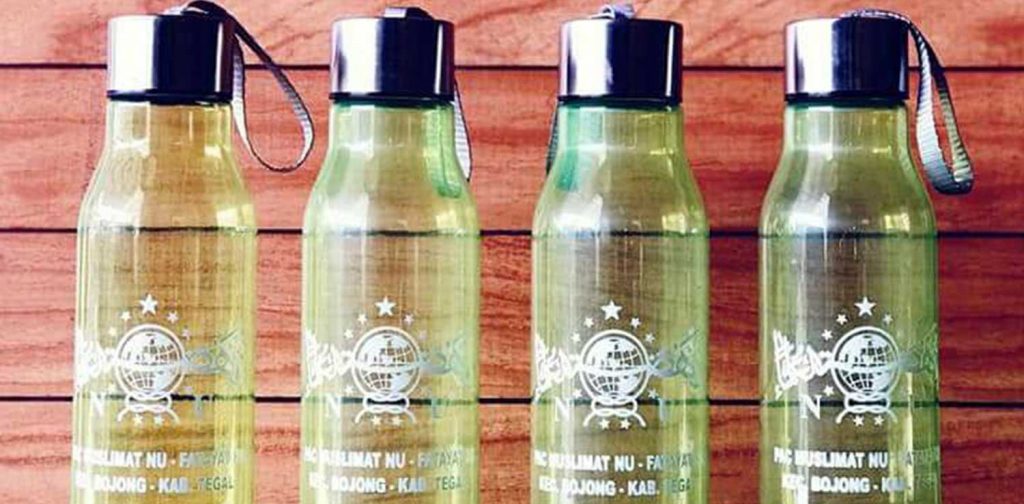Muslimat NU of Bojong-Tegal Campaigns Environmental Protection, Reduces Waste Production

Customized water bottle by Muslimat NU Bojong | Image: Muslimat NU Bojong
Muslimat NU members in Bojong District, Tegal Regency, Central Java Province of Indonesia were anxious about accumulations of waste from their food consumption on the regular coordination and recitation meetings “muzakarah.” They responded to the anxiety by no longer using single-use plastic bottles and styrofoam containers for their muzakarah consumption.
Muslimat NU is the women’s wing organization of Nahdlatul Ulama, the largest Muslim civil society organization in Indonesia. It is a platform for the NU women’s movement to play an active role in social development. They have branches from the village, district, regency, province to the national levels with an estimate of millions of structural and cultural members throughout the country.
Before the Covid-19 pandemic, Muslimat NU of Bojong District’s muzakarah used to be held routinely every Sunday Kliwon morning, referring to the Javanese calendar system, attended by hundreds of members from all villages in the district. Since the Covid-19 pandemic, the muzakarah is centralized in the NU Building in the district, and attendance is limited for the core committee only.
“Of course! We do a stringent health protocol during the Covid-19 pandemic,” says Umi Atiqoh, a Muslimat NU member from Tuwel Village in Bojong District, to Green Network.
Before starting that new initiative, Muslimat NU of Bojong District still used single-use plastic bottles and styrofoam containers to serve muzakarah consumption. Since mid-2019, they have decided to move on to a more environmentally friendly consumption practice. Based on the agreement of the members’ deliberations, they initiated a movement to reduce waste production, especially for waste that is hard to decompose in nature.
As a substitute, Muslimat NU of Bojong District uses tumblers and banana leaves. They produce the tumblers then sell them to all members throughout the villages in the district. The profits generated are utilized to fund organizational activities for both the village and district levels.
This initiative has now become one of the flagship programs of Muslimat NU of Bojong District. Now in every muzakarah, all members must bring drinking water from home using their tumblers. The food and dishes are also packed in environmentally friendly banana leaves.
“It is a part of our real action to preserve the environment by reducing single-use containers that generate waste accumulation,” says Bariroh, the Chair of Muslimat NU of Bojong District, when Green Network clarifies the information regarding the initiative.
Waste management is a big challenge in Indonesia. Reducing waste production is a crucial step in the waste management system, while considered to have the most sustainable impact on environmental conservation.
“Anyone who wants to start an environmental conservation initiative, please start from your very self, ibda’ binafsik. Then strengthen your commitment,” Bariroh says.
Editor: Marlis Afridah
Translator: Aliyah Assegaf
To learn the original version of this article in Indonesian, read Green Network ID.

Co-create positive impact for people and the planet.
Amidst today’s increasingly complex global challenges, equipping yourself, team, and communities with interdisciplinary and cross-sectoral insights on sustainability-related issues and sustainable development is no longer optional — it is a strategic necessity to stay ahead and stay relevant.

Zia Ul Haq
Zia is a Reporter at Green Network Asia. He graduated from UIN Sunan Kalijaga Yogyakarta with a bachelor's degree in Islamic Education. He is currently a Learning Companion at Qaryah Thayyibah Learning Community (KBQT).


 Reframing Governance in the Era of Water Bankruptcy
Reframing Governance in the Era of Water Bankruptcy  Strengthening Resilience amid Growing Dependence on Space Infrastructure
Strengthening Resilience amid Growing Dependence on Space Infrastructure  Indian Gig Workers Push Back Against 10-Minute Delivery Service Strain
Indian Gig Workers Push Back Against 10-Minute Delivery Service Strain  Call for Governance: Grassroots Initiatives Look to Scale Efforts to Conserve Depleting Groundwater
Call for Governance: Grassroots Initiatives Look to Scale Efforts to Conserve Depleting Groundwater  Integrating Environment, Climate Change, and Sustainability Issues into Education Systems
Integrating Environment, Climate Change, and Sustainability Issues into Education Systems  Finally Enforced: Understanding the UN High Seas Treaty
Finally Enforced: Understanding the UN High Seas Treaty